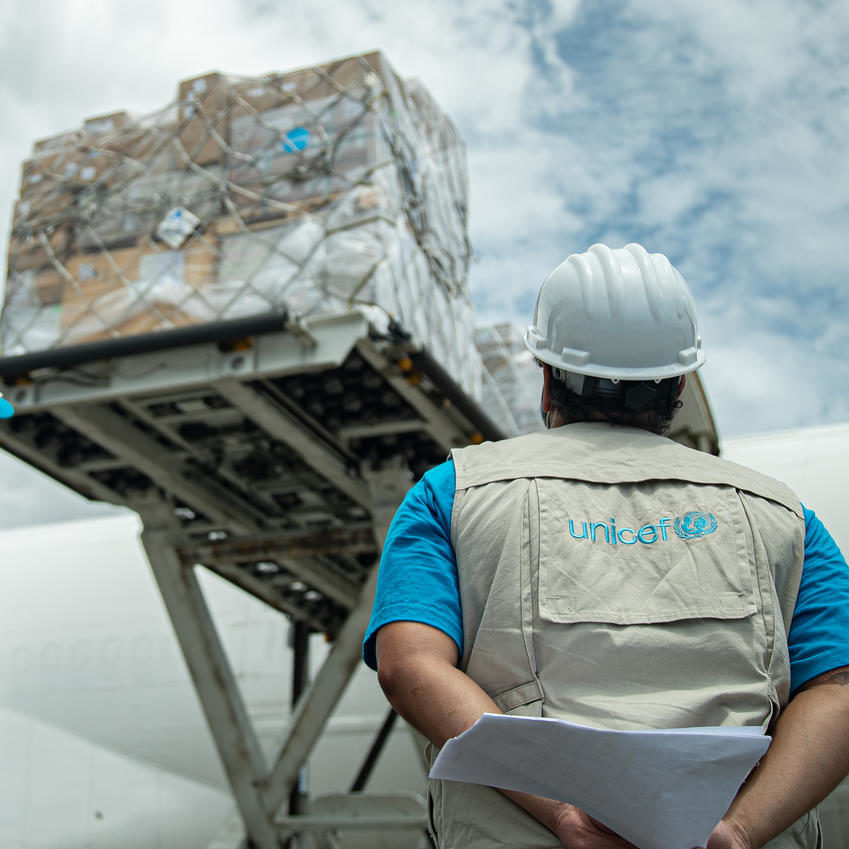NEW YORK, 18 December 2020 – UNICEF could potentially transport up to 850 tonnes of coronavirus vaccines per month in 2021, should such quantities become available, according to a new assessment. This is more than double the average weight of vaccines UNICEF transports every month.
The assessment is part of UNICEF’s work to lead on the procurement and delivery of COVID-19 vaccines for 92 low- and lower middle-income countries on behalf of the COVAX Facility, in collaboration with the Pan American Health Organization (PAHO).
“This is a mammoth and historic undertaking,” said Henrietta Fore, UNICEF Executive Director. “The scale of the task is daunting, and the stakes have never been higher, but we are ready to take this on.”
The UNICEF assessment looked at global airfreight capacity and transport routes to better understand the challenges of delivering COVID-19 vaccines in 2021. It found that commercial airlines will be able to deliver vaccines to almost all 92 low- and lower-middle-income countries, which are among the 190 economies participating in the COVAX Facility, at an estimated cost of up to US$70 million.
Comparing vaccine volume estimates against commercial and cargo routes across the globe, the assessment also found that current air cargo capacity would be sufficient to make deliveries covering 20 per cent of the population for most of the 92 countries. COVID-19 vaccines are expected to be primarily shipped using existing passenger and cargo flight capacity, although charters or alternative transport options may still be needed for some small countries and others with access issues. UNICEF is working with airlines and the wider logistics industry to prioritise the delivery of COVID-19 vaccines around the world.
One major challenge in the COVID-19 vaccine operation is local cold chain capacity for vaccine storage within some low- and lower-middle-income countries. UNICEF, WHO and Gavi, the Vaccine Alliance, developed a guidance note on supply and logistics to help countries develop their supply chain strategies to receive, store, distribute and manage COVID-19 vaccines and related products. Given the range of storage temperatures required for COVID-19 vaccines, countries will continue to train logisticians and health workers on how to keep COVID-19 vaccines at the right temperatures.
As part of a programme that started in 2017, with support from Gavi, UNICEF continues to procure and support the installation of 70,000 cold-chain fridges in lower-income countries by the end of 2021, which will help in the roll-out of COVID-19 vaccines that need to be stored at 2 to 8 degrees Celsius. Almost half of these will be solar powered.
UNICEF, WHO and Gavi are also working to help countries prepare and develop national deployment and vaccination plans for the large-scale roll out of COVID-19 vaccines. Currently, countries are continuing to monitor their readiness against key milestones, which include expediting regulatory approvals and putting in place ways to monitor vaccine safety.
In addition, a UNICEF meeting this week with more than 300 vaccine procurement experts globally, including government officials, looked at ways to procure and roll-out COVID-19 vaccines and strengthen regulatory systems and supply chains.
Funding is critical. UNICEF has called for US$410 million to help countries with the delivery of vaccines, therapeutics and diagnostic tools in 2021. Further, UNICEF estimates a funding gap of US$133 million to cover in-country vaccine logistics and the required cold chain equipment for the poorest 92 countries.
“With the imminent arrival of globally approved COVID-19 vaccines, we can begin to see signs of hope. But hope will not be restored by the vaccine alone,” said Fore. “Countries need urgent technical and financial support to strengthen their capacities for cold and supply chains, to train health workers, and to work with communities in combatting misinformation and building trust in vaccines. Without urgent funding and support, many of the poorest countries still risk being left behind.”
ENDS
Notes for Editors:
Download photos and broll here: https://weshare.unicef.org/Package/2AM408J6YP9G
About COVAX
COVAX is the vaccines pillar of the ACT-Accelerator. It is co-led by the Coalition for Epidemic Preparedness Innovation (CEPI), Gavi, the Vaccine Alliance, and the World Health Organization (WHO) – working in partnership with developed and developing country vaccine manufacturers, UNICEF, the World Bank, Civil Society Organisations and others. COVAX is the only global initiative that is working with governments and manufacturers to ensure COVID-19 vaccines are rapidly available worldwide to economies of all financial means.
Find out more about UNICEF’s work on the COVID-19 vaccines here, or about UNICEF’s work on immunization here.
About UNICEF
UNICEF is the world’s leading organisation for children, promoting the rights and wellbeing of every child, in everything we do. Together with our partners, we work in 190 countries and territories to translate that commitment into practical action, focusing special effort on reaching the most vulnerable and excluded children, to the benefit of all children, everywhere.
Unicef UK raises funds to protect children in danger, transform their lives and build a safer world for tomorrow’s children. As a registered charity we raise funds through donations from individuals, organisations and companies and we lobby and campaign to keep children safe. Unicef UK also runs programmes in schools, hospitals and with local authorities in the UK.
Follow UNICEF UK on Twitter, LinkedIn, Facebook and YouTube.
For more information, please contact:
Yemi Lufadeju, +44 20 7375 6199, [email protected]
Unicef UK Media Team, 0207 375 6030, [email protected]


